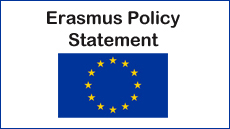
The strategy of International VISION University – Gostivar, regarding objectives and priorities for the Erasmus activities, in the context of the Lifelong Learning Programme, is contained in its mission statement. Namely, the University is committed to generating knowledge and science, as well as creating and cherishing cultural social values. International VISION University targets to provide guidelines for strengthening student mobility through better and increased promotion and support activities fostering the internationalization of universities. It explains the growing importance of academic mobility and discusses many benefits for higher education institutions as a whole as well as for the individual.
Studying and living abroad is one of the key elements in reducing regional (self) isolation and to combat the increasing radicalization of youth. Student mobility and especially studying abroad are particularly important for student personal development with positive effects also for regions themselves. Student mobility is a unique opportunity for every candidate to gain invaluable new experience, to learn foreign languages and to develop interpersonal skills in a new and culturally diverse environment. One of the most valuable results is the increased number of young professionals who can make a positive impact on their local environment, thanks to their exposure to wider experiences through studying elsewhere.
International VISION University in Gostivar is part of the growing interdependence of the international academic communities in building new forms of creative cooperation keeping with the global scientific, technological and educational innovation. International VISION University considers the Erasmus mobility programme to be essential regarding many factors, including improving the quality and increasing the number of student and teaching staff mobility throughout Europe by:
-Increasing attainment levels to provide the graduates and researchers Europe needs
-Improving the quality and relevance of higher education
-Strengthening quality through mobility and cross-border collaboration
-Making the knowledge triangle work
-Improving governance and funding
Additionally, since the University has established and implemented the European System for Transfer and Accumulation of Credits (ECTS), the participation in the Erasmus mobility programme will contribute to increasing the quality and compatibility of the study programmes, as well as increasing the degree of transparency between the qualifications gained in Europe.
Furthermore, the participation in the Erasmus programme will contribute to the development of methods that are based on best practices and transfer of innovative solutions in the field of education, which, on the other hand will have a direct impact on the future employability of the graduates.
Within the frames of activities towards approaching the European Higher education Area, the University carries out its specific policy for openness for new partnerships, particularly with EU counterparts, for the purpose of faster implementation of the priorities of the Action Plan of the Strategy for International Cooperation.
In the spirit of internationalization, the key role in the process of giving visibility to the Erasmus programme for our University, is assigned to the International Relations Officers, who will continually give publicity to the programme. The International Relations Office, following this prime activity, will organize internal workshops and presentations for the purpose of making the mobility processes more transparent for all interested parties. All the activities related to the Erasmus Programme will be published as special articles in the University News. Academic mobility activities to the Erasmus Programme will be built upon the previous experience on the part of the International Relations Officers.
International collaborative partnerships are a core element in our broader strategic objectives in regard to teaching, learning and research. Our Code of Practice on Collaborative Provision provides guidance and criteria to facilitate and support the establishment (including risk assessment and strategic “fit”), quality assurance, development, monitoring and evaluation of cross-border collaborations.
By improving and strengthening the quality of the higher education, International VISION University has set a goal of an “entrepreneurial university” as one of its development priorities of the next period, alongside quality in research and teaching. This means (1) facilitating university-enterprise relations and the development of university spin-offs; (2) incorporating innovation and entrepreneurial attitudes and skills into curricula; (3) enforcing the requirement that every curricula include a practical traineeship for building students’ experience, skills and future employability. The “knowledge triangle” between education, research and business, supported by the Programme is crucial in achieving this goal. International VISION University plans to encourage the development of international traineeships in particular, especially with partners in neighboring countries.


























